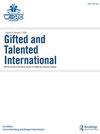Assessing creative problem solving ability in mathematics: The DISCOVER Mathematics Assessment
Q3 Social Sciences
引用次数: 4
Abstract
ABSTRACT The purpose of this study was to revise and revalidate the scoring procedure of the DISCOVER Mathematics Assessment to allow evaluators to better measure creative problem solving ability in mathematics, identify gifted students, and evaluate the programs for creative problem solving. The data consisted of scores of 233 students selected from five different grade levels. We compiled descriptive statistics and conducted regression analyses to compare the relationships between both the original and revised versions of the scoring system and general creativity. The revised scoring system was more effective when predicting variance in general creativity for overall problem-solving performance, and performance in semi-open-ended problems. It also predicted more variance in general creativity for the group Higher Grade Levels than the group Lower Grade Levels. Therefore, we suggested that quality should be considered as well as fluency, flexibility, and originality when scoring assessments for creative problem solving ability in mathematics.评估数学创造性问题解决能力:DISCOVER数学评估
摘要本研究的目的是修订和重新验证DISCOVER数学评估的评分程序,使评估者能够更好地衡量数学中创造性问题解决能力,识别天才学生,并评估创造性问题解决方案。数据包括从五个不同年级选出的233名学生的成绩。我们编制了描述性统计数据,并进行了回归分析,以比较评分系统的原始版本和修订版本与总体创造力之间的关系。修正后的评分系统在预测整体解决问题表现的一般创造力和半开放式问题表现的差异时更有效。它还预测,与低年级组相比,高年级组的总体创造力差异更大。因此,我们建议在对数学创造性问题解决能力进行评分时,应考虑质量以及流利性、灵活性和独创性。
本文章由计算机程序翻译,如有差异,请以英文原文为准。
求助全文
约1分钟内获得全文
求助全文

 求助内容:
求助内容: 应助结果提醒方式:
应助结果提醒方式:


